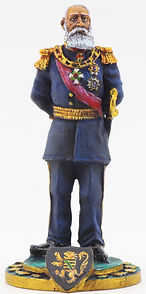top of page


Kingdom of Belgium

Unity makes strength

Henri
de Merode-Westerloo

Robert-Marie-Léon
d'Ursel

In 1830, the Belgian Revolution led to the re-separation of the Southern Provinces from the Netherlands and to the establishment of a Catholic and bourgeois, officially French-speaking and neutral, independent Belgium under a provisional government and a national congress. Since the installation of Leopold I as king on 21 July 1831, now celebrated as Belgium's National Day, Belgium has been a constitutional monarchy and parliamentary democracy, with a laicist constitution based on the Napoleonic code. French was originally the official language used by the nobility and the bourgeoisie, especially after the rejection of the Dutch monarchy. French progressively lost its dominance as Dutch began to recover its status. This recognition became official in 1898. Belgium was not a belligerent in the Franco-Prussian War 1870–71, but the proximity of the war led to the mobilisation of the army. After the conflict, there was talk of modernising the military. The system of Remplacement (whereby wealthy Belgians conscripted into the military could pay for a "replacement") was abolished and an improved system of conscription implemented. These reforms, led by d'Anethan under pressure from Leopold II, divided Belgian politics. The Catholics united with the Liberals under Frère-Orban to oppose them, and the reforms were finally defeated
when d'Anethan's government fell during an unrelated scandal. Eventually, the military was reformed. The Berlin Conference of 1885 ceded control of the Congo Free State to King Leopold II as his private possession. From around 1900 there was growing international concern for the extreme and savage treatment of the Congolese population under Leopold II, for whom the Congo was primarily a source of revenue from ivory and rubber production.
bottom of page





